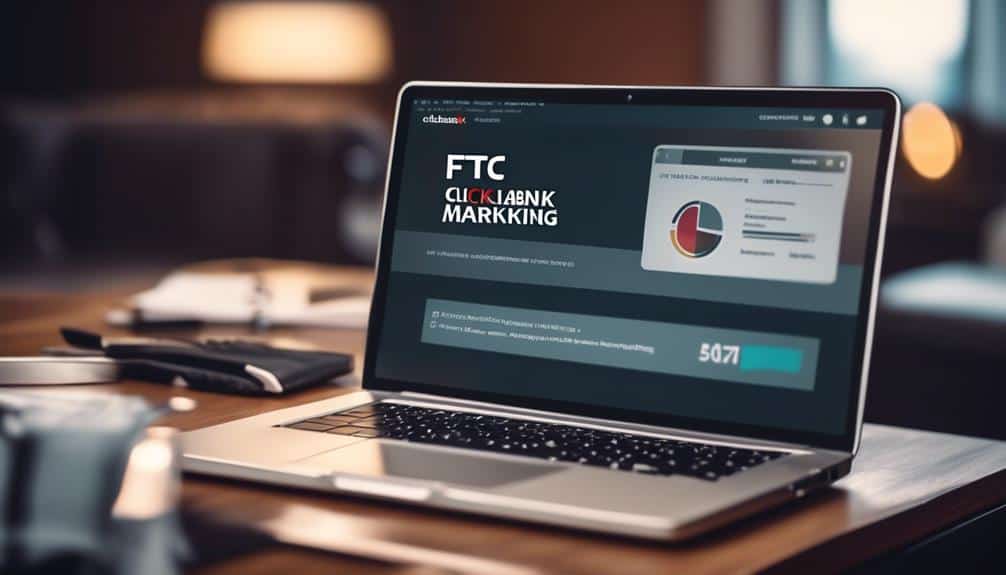Bulletproof Your Affiliate Marketing: FTC Compliance Tips for ClickBank Users
Did you know that in 2020, the Federal Trade Commission (FTC) received over 64,000 reports of fraud related to online shopping and general merchandise?
As a ClickBank user navigating the world of affiliate marketing, ensuring FTC compliance is crucial to protect both your reputation and bottom line.
From understanding the FTC guidelines to implementing best practices for testimonials, there are key strategies you need to know to stay on the right side of the law.
Stay tuned to discover how you can safeguard your affiliate marketing efforts and avoid potential legal pitfalls.
Key Takeaways
- Always disclose affiliations, sponsorships, or partnerships influencing content to maintain transparency and trust with the audience.
- Ensure all claims made in marketing materials are supported by evidence and data to demonstrate integrity, reliability, and credibility to customers.
- Use real customer testimonials that reflect truthful experiences and avoid exaggerated claims to build trust and authenticity.
- Regularly monitor compliance status, utilize automated alerts, and be aware of the legal consequences of non-compliance to avoid fines, lawsuits, and damage to reputation.
Understanding FTC Guidelines

To ensure compliance with FTC regulations, ClickBank users must understand the guidelines set forth by the Federal Trade Commission. When engaging in affiliate marketing through ClickBank, it's crucial to adhere to the FTC guidelines to maintain transparency and build trust with your audience.
The FTC guidelines require that any material connection between an affiliate marketer and the product or service being promoted must be disclosed. This means clearly stating any affiliations, sponsorships, or partnerships that may influence the content being shared.
Furthermore, the FTC mandates that all claims made about a product or service must be truthful and backed by evidence. ClickBank users should thoroughly review the products they're promoting to ensure that they deliver on any promises or guarantees made in their marketing materials. It's essential to avoid misleading or deceptive practices that could mislead consumers.
Disclosures and Transparency
Understanding the importance of disclosures and transparency is fundamental for ClickBank users to maintain compliance with FTC regulations and build credibility with their audience. When it comes to affiliate marketing, disclosing your relationship with the products or services you promote is crucial. Clear and transparent disclosures not only keep you compliant with the law but also establish trust with your audience.
To ensure you are meeting the necessary disclosure requirements, here are some key points to keep in mind:
| Disclosure Clarity | Transparency | Affiliate Responsibilities |
|---|---|---|
| Clearly state your relationship with the promoted product/service. | Be open about any financial or non-financial incentives you receive. | Understand and follow FTC guidelines on disclosures. |
| Disclosures should be noticeable and easy to understand. | Provide genuine and unbiased recommendations. | Regularly review and update your disclosure practices. |
| Avoid ambiguous language or vague terms in your disclosures. | Explain how you benefit from the affiliate relationship. | Educate yourself and your team on disclosure best practices. |
| Include disclosures in various formats like text, audio, and video. | Communicate any potential conflicts of interest. | Encourage transparency within your affiliate network. |
| Prioritize disclosure clarity over aesthetics. | Maintain transparency even in social media posts. | Take responsibility for ensuring proper disclosure practices. |
Claim Substantiation Requirements

When making claims in your marketing materials, ensure you have evidence to support them. The FTC requires supporting data to back up assertions about your product or service.
It's crucial to have the necessary documentation ready to substantiate any claims you make.
Evidence for Claims
For compliance with FTC regulations, ensure that you have adequate evidence to substantiate any claims made in your ClickBank promotions. Adhering to evidence guidelines is crucial to maintain transparency and trust with your audience. When making claims about your product or service, it's essential to have solid proof to back them up.
This could include scientific studies, customer testimonials, expert endorsements, or data from reliable sources. Claim verification isn't just a legal requirement but also a way to build credibility and avoid potential legal issues. By diligently collecting and maintaining evidence for your claims, you demonstrate integrity and reliability to your customers.
Supporting Data Needed
To ensure compliance with FTC regulations regarding claim substantiation requirements for ClickBank promotions, it's imperative to gather and maintain the supporting data needed to back up any assertions made about your product or service.
Conduct thorough data analysis to ensure that all statements are supported by factual evidence. Utilize case studies that showcase the effectiveness or benefits of your product/service to provide concrete examples of your claims.
Keeping detailed records of this supporting data is essential for demonstrating the validity of your marketing assertions. By incorporating data analysis and relevant case studies into your promotional materials, you not only enhance your credibility with customers but also safeguard yourself against potential legal issues.
Back up Assertions
Utilize concrete evidence and relevant case studies to substantiate the claims you make about your product or service, ensuring compliance with FTC regulations. Providing supporting evidence not only strengthens your credibility but also helps in the trustworthiness assessment by potential customers. Here is a table to illustrate how you can back up your assertions effectively:
| Claim Made | Supporting Evidence | Trustworthiness Assessment |
|---|---|---|
| Product Efficacy | Clinical trial results, customer testimonials | Demonstrates product effectiveness and user satisfaction |
| Performance Claims | Data from independent testing, before-and-after comparisons | Shows the product's capabilities and reliability |
| Price Competitiveness | Price matching data, competitor comparisons | Highlights the product's value and market positioning |
Best Practices for Testimonials

When showcasing testimonials, ensure they reflect the truthful experiences of customers, aligning with FTC guidelines.
Strive to comply with regulations, avoiding any misleading or unsubstantiated claims in testimonials.
Implementing best practices in testimonials can help maintain transparency and credibility in your marketing efforts.
Truth in Testimonials
For genuine and effective testimonials on ClickBank products, strive to present real experiences from satisfied customers. Testimonial authenticity is crucial in ethical marketing practices.
When gathering testimonials, ensure they reflect honest feedback from individuals who've genuinely used the product or service. Avoid embellishing or fabricating testimonials, as this can mislead potential customers and harm your reputation.
Encourage customers to share their experiences honestly, whether positive or negative, to maintain transparency and build trust with your audience. Remember that authenticity is key in creating compelling testimonials that resonate with potential buyers.
Compliance With Guidelines
To ensure compliance with guidelines regarding testimonials, prioritize transparency and accuracy in all customer feedback shared on ClickBank products. When managing testimonials for affiliate marketing, consider the following compliance strategies to align with FTC regulations:
- Disclosure: Clearly disclose any material connections between endorsers and the product.
- Truthfulness: Ensure all testimonials reflect honest opinions and experiences.
- Consistency: Maintain consistency in how testimonials are collected and displayed.
- Monitoring: Regularly monitor testimonials to address any misleading or inaccurate content.
- Education: Educate affiliates on FTC guidelines to promote compliance within the affiliate marketing realm.
Avoid Misleading Claims
In order to maintain transparency and compliance with FTC regulations, it is crucial to ensure that testimonials provided for ClickBank products avoid any misleading claims. When showcasing testimonials, always prioritize ethics in marketing and strive for honest advertising practices. Misleading claims can harm your reputation and violate FTC guidelines, leading to potential legal consequences. Below is a table outlining best practices for testimonials to help you navigate this aspect of affiliate marketing effectively:
| Best Practices for Testimonials | Description | Importance |
|---|---|---|
| Use real customers | Ensure testimonials are from actual users of the product | Upholds honesty in advertising |
| Avoid exaggerated claims | Keep testimonials truthful and realistic | Builds trust with customers |
| Disclose any material connections | Be transparent about any relationships with endorsers | Demonstrates ethical conduct |
| Update testimonials regularly | Ensure the information remains relevant and current | Shows commitment to providing accurate information |
Compliance Monitoring Tools
Utilize advanced software solutions that enable efficient monitoring of compliance measures to ensure adherence to FTC regulations. Ensuring compliance tracking in affiliate marketing campaigns is crucial for your success as a ClickBank user. Here are some key features to look for in compliance monitoring tools:
- Real-time Monitoring: Stay updated on your campaigns' compliance status instantly.
- Automated Alerts: Receive notifications for any potential compliance issues.
- Compliance Reporting: Generate detailed reports to track your adherence to regulations.
- Customizable Settings: Tailor the monitoring tools to suit your specific compliance needs.
- Historical Data Analysis: Review past compliance trends to improve future campaigns.
Legal Consequences of Non-Compliance
As a ClickBank user, failing to adhere to compliance measures despite having access to advanced monitoring tools can lead to serious legal repercussions. Ignoring FTC guidelines and regulations puts you at risk of facing potential penalties and legal risks that could harm your business and personal finances. Non-compliance may result in hefty fines, lawsuits, and damage to your reputation within the affiliate marketing community.
The Federal Trade Commission (FTC) takes violations of affiliate marketing laws seriously, and they've the authority to investigate and penalize offenders. If found guilty of non-compliance, you could face fines that range from thousands to millions of dollars, depending on the severity of the violation. Additionally, lawsuits from consumers or other businesses could further escalate the legal consequences, leading to significant financial losses and legal battles.
To safeguard yourself and your affiliate marketing endeavors, it's crucial to prioritize compliance and stay informed about the latest FTC regulations. By abiding by the rules and utilizing the monitoring tools provided by ClickBank, you can mitigate the potential penalties and legal risks associated with non-compliance.
Frequently Asked Questions
How Can I Ensure That My Affiliate Marketing Practices Are Compliant With FTC Guidelines Without Being Too Restrictive?
To ensure FTC compliance in your affiliate marketing, focus on transparency measures and legal requirements. Implement compliance strategies while still using effective marketing tactics. By being open and following guidelines, you can maintain trust without feeling too restrictive.
What Are Some Creative Ways to Make Disclosures and Transparency More Engaging for My Audience?
To enhance transparency, engage with interactive disclosures. Use visual storytelling for engaging disclaimers. Gamify transparency to captivate your audience. Make disclosures interesting and easy to understand. Create a fun and informative experience for your viewers.
How Can I Effectively Substantiate Claims Made in My Affiliate Marketing Campaigns to Avoid Legal Issues?
To effectively substantiate claims in affiliate marketing, ensure evidence-based marketing. Use clear, legally compliant disclosures. Stay updated on regulatory requirements and employ compliance strategies. Protect your business by prioritizing transparency and honesty in your campaigns.
Are There Any Specific Guidelines for Using Testimonials in Affiliate Marketing That I Need to Be Aware Of?
When using testimonials in affiliate marketing, ensure authenticity. To avoid legal implications, verify testimonials are truthful and represent typical results. Provide clear disclosures on any material connections between endorsers and the product/service being promoted.
What Are Some Recommended Compliance Monitoring Tools That Can Help Me Stay on Top of Any Changes in FTC Regulations Related to Affiliate Marketing?
To keep up with FTC regulations in affiliate marketing, utilize compliance monitoring tools like ClickBank's updates and alerts. These resources provide essential guidance for ClickBank users, helping you stay informed and compliant.
Conclusion
In conclusion, ensuring FTC compliance in your affiliate marketing efforts is crucial for maintaining trust with your audience and avoiding legal consequences. By following guidelines for disclosures, claim substantiation, testimonials, and utilizing compliance monitoring tools, you can safeguard your ClickBank affiliate business.
Stay informed, transparent, and proactive in your compliance efforts to protect your brand and reputation in the competitive affiliate marketing landscape.








